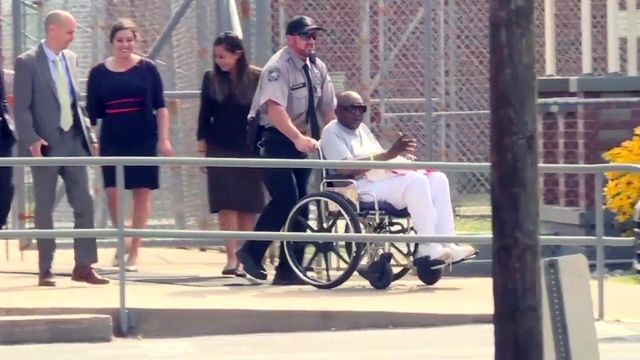Wrongfully convicted Wilson man freed after four decades in prison
Five months after a federal appeals court threw out his murder conviction, and more than 40 years after he was sentenced to death, Charles Ray Finch was freed Thursday.
Posted — UpdatedA federal appeals court ruled in January that Finch was denied a fair trial because of a flawed lineup law enforcement used to obtain an eyewitness identification of Finch as the suspected killer.
With the state unlikely to retry the case – Wilson County District Attorney Robert Evans has 30 days to formally announce his decision – U.S. District Judge Terrence Boyle on Thursday granted Finch his freedom.
Finch, now 81 and in failing health, was wheeled out of Greene Correctional Institution in Maury into a waiting minivan at about 4:30 p.m. Thursday to take him to a reunion with his family. He told them he wanted a home-cooked dinner with all the fixings, so they went to eat at Parker's Barbecue in Wilson.
"I have been waiting on this day all my life," Finch's daughter, Katherine Jones-Bailey, said outside the federal courthouse in downtown Raleigh. "Miracles happen every day, and today is our day."
The family has been working for years to gain Finch's release, and his children, brother and other relatives broken down in court when they learned their efforts finally paid off.
"Every time I would go see him, he had that hatred, so I would have to talk to him about forgiveness, so that, when we pray, our prayers would not be in vain," said Jones-Bailey, who was 2 when her father was sent to prison. "Look at what God has done. Thank you, God."
Finch was convicted and sentenced to death in 1976 for the killing of Richard Holloman during an attempted robbery of a Wilson grocery store. The North Carolina Supreme Court vacated the death sentence the following year after the U.S. Supreme Court declared the state's mandatory death penalty unconstitutional, and he was resentenced to life in prison.
He maintained his innocence through the years, and Duke University’s Wrongful Convictions Clinic began looking at his case in the early 2000s, digging up evidence to support his innocence claim.
"We have students who work their hearts out on these cases," said Jim Coleman, director of the Duke legal clinic. "They work through summer vacations. They work through summer jobs. We tell [clients] that we never give, they never give up."
The 4th U.S. Circuit Court of Appeals found significant problems with the evidence used to convict Finch. The court said, for example, that he was subjected to "suggestive lineups" because he was the only person wearing a jacket similar to one a witness to the shooting said the gunman was wearing.
A review of the autopsy determined Holloman had been shot with a pistol, not a shotgun as the witness stated, and new ballistics evidence contradicted prosecution claims that shells found at the crime scene matched a shotgun shell found in Finch’s car. Other witnesses also indicated they had been pressured by investigators into providing testimony implicating Finch.
"I'm glad it's over, thank God," said Jimmie Brown, Finch's brother. "I'm glad it's over and everybody feels good about it."
Related Topics
• Credits
Copyright 2024 by Capitol Broadcasting Company. All rights reserved. This material may not be published, broadcast, rewritten or redistributed.






